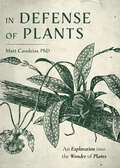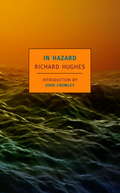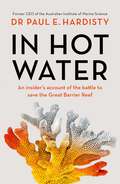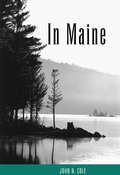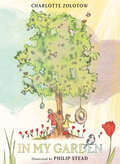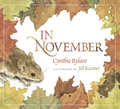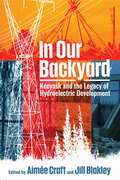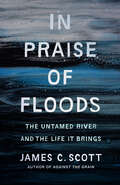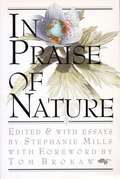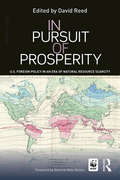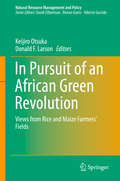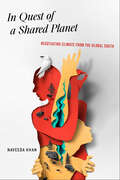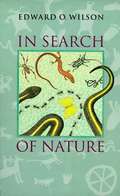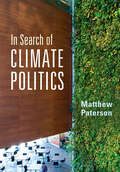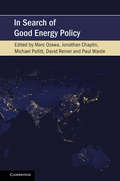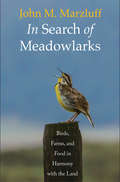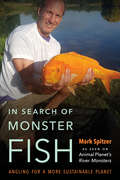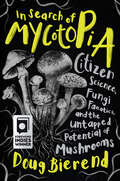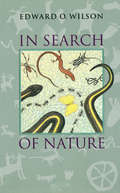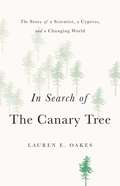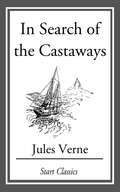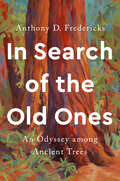- Table View
- List View
In Defense of Plants: An Exploration into the Wonder of Plants
by Matt Candeias PhDCultivate Inner Peace Through Positive Affirmations and Spiritual Meditation“52 Ways to Live the Course in Miracles is a compact rendition of how to live with love and forgiveness at the center of our lives." ─Allyson Gracie, Retailing Insight#1 Best Seller in SpiritualismFind the path to inner peace through a weekly guide of spiritual meditations and positive affirmations.Use Karen Casey’s 52 positive affirmations and meditations to find inner peace. We all face struggles that can leave us feeling broken and hopeless. But peace and healing are always available to us if we are open to them. Karen Casey is a beloved author who has helped millions onto the road to recovery with her inspirational self-help and meditation writings. In this inspirational book, Karen takes readers on a journey towards peaceful living by sharing how she has found serenity in her own life. Karen teaches readers that the goal is not perfection, but rather progress towards creating a life of love and peace. Cultivate a simpler, slower, more love-filled life. When Karen Casey was struggling with addiction, she found life-changing inspiration in Helen Schucman’s book, A Course in Miracles. In 52 Ways to Live the Course in Miracles, she shares the ideas she discovered in Helen Schucman's book and the spirituality that we can all bring to our own lives.Find inside:Meditations and affirmations that lead to a simpler, slower lifeInsights into Helen Schucman’s A Course in MiraclesStories of the author’s own struggles and triumphs on her path to healingIf you enjoyed reading other books like Practicing Mindfulness, The Untethered Soul Guided Journal, or A Year of Mindfulness, then you’ll love 52 Ways to Live the Course in Miracles.
In Gallant Company (Richard Bolitho Novels #3)
by Alexander KentAs the American Revolution rages on the mainland, the British Navy prepares for action at sea. Against a growing fleet of American and French privateers, the navy must maintain its blockade of Washington's vital military supplies. Caught up in the turmoil, junior officer Richard Bolitho finds himself having to make momentous decisions in the heat of battle--decisions that could affect the lives of many men and, perhaps, even the fate of nations.
In Ghostlight: Poems (Southern Messenger Poets)
by Ryan WilsonIn Ghostlight, a long-awaited second collection of original poems by Ryan Wilson, considers the haunting of the contemporary mind. With virtuosic formal variety and masterful craft, these poems range from rural America to Italy to the Holy Land, as they chronicle the dynamism of a spiritual odyssey toward the eternal through both past and present. Wilson employs sonnets, Pindaric and ballad stanzas, alliterative hemistichs in imitation of the Anglo-Saxon, and other ancient forms to enlighten the modern experience, from smartphones and Facebook to jumbo jets, entangled in a reciprocal relationship with myths, sacred literature, and traditions.Revealing that the past and the everlasting can inform the present at any given moment, In Ghostlight conveys how a vision acknowledging this dual illumination helps us understand ourselves and others in our fraught, complex era.
In Hazard
by John Crowley Richard HughesThe Archimedes is a modern merchant steamship in tip-top condition, and in the summer of 1929 it has been picking up goods along the eastern seaboard of the United States before making a run to China. A little overloaded, perhaps--the oddly assorted cargo includes piles of old newspapers and heaps of tobacco--the ship departs for the Panama Canal from Norfolk, Virginia, on a beautiful autumn day. Before long, the weather turns unexpectedly rough--rougher in fact than even the most experienced members of the crew have ever encountered. The Archimedes, it turns out, has been swept up in the vortex of an immense hurricane, and for the next four days it will be battered and mauled by wind and waves as it is driven wildly off course. Caught in an unremitting struggle for survival, both the crew and the ship will be tested as never before. Based on detailed research into an actual event, Richard Hughes's tale of high suspense on the high seas is an extraordinary story of men under pressure and the unexpected ways they prove their mettle--or crack. Yet the originality, art, and greatness of In Hazard stem from something else: Hughes's eerie fascination with the hurricane itself, the inhuman force around which this wrenching tale of humanity at its limits revolves. Hughes channels the furies of sea and sky into a piece of writing that is both apocalyptic and analytic. In Hazard is an unforgettable, defining work of modern adventure.
In Hot Water: Inside the battle to save the Great Barrier Reef
by Paul E. HardistyIn the ongoing climate wars, the Great Barrier Reef has become a symbol of everything that we have to lose from global warming. For years, reports of the world-famous coral being irreversibly bleached have fuelled an ideological battle between those fighting to stop the damage and those who insist the danger is overblown.Paul Hardisty found himself in the middle of this fight during his six years as CEO of the Australian Institute of Marine Science. In this fascinating, candid and urgent book, he dives into the history of the reef and cuts through the rhetoric to chart the circumstances and acceleration of its decline, as well as the determined efforts to save it.In Hot Water is a crucial look inside the battle to save one of Australia's greatest treasures, describing what must be done to preserve it, and what is at risk if we fail to do so.
In Maine: Essays On Life's Seasons
by John N. ColeCollection of essays by the late John N. Cole. Cole writes with passion about his life, the outdoors and the glorious rhythms of nature. Originally released in the 1970s and unavailable for two decades, this revised Islandport Press edition features new essays and photographs. For decades, John Cole wrote with passion about his life, the outdoors and the glorious rhythms of nature. In Maine, like all his essays and books, draws deep from his lifelong partnership and his fascination with the natural world from commercial fishing in the waters off Long Island, New York to chasing stripers in Casco Bay, Maine, to quietly observing the shifting winds that roll across the local meadow and the annual change of seasons, a ritual he finds exhilarating. "Few realities life can muster are capable of destroying the zest and richness of September and October in this northeast," he writes. Cole has gained insight and contemplated potential lessons during his journey. He notes the changes that have come to the world and those that are coming. And he laments the basics of nature that too often pass unnoticed today, but remain important parts of our past and possibly our future. "Men cannot live without knowing... knowing which way the wind blows, which way the rain falls, how the sea surges, the land lives and the forest dies." To do so, he says, is unnatural.In Maine, originally published in 1974 and available again for the first time in 25 years, features essays that appeared in the Maine Times during its formative years but remain as fresh and insightful as ever. The revised edition also includes new essays that sparkle with the same energy and enthusiasm as Cole's earlier work.
In My Garden
by Charlotte ZolotowWelcome the outdoors inside for story time with this classic tale of a garden changing through the seasons.A young girl and her older companion watch birds, fly a kite, plant flowers, and play in the snow, watching flowers bloom and leaves fall as the year passes. This quiet story celebrates the simple joys found close to home, and the importance of sharing those experiences with the ones you love. A perfect story time pick for any season, In My Garden explores the natural marvels of the world around us and encourages young readers to think about what they love best throughout the year. Written by picture book master Charlotte Zolotow and originally published in 1960, this elegant reimagining of In My Garden features all-new illustrations by accomplished author-illustrator Philip Stead. His delicate illustrations and gentle, colorful palette bring new life and meaning to this classic tale-- a beautiful tribute to the experience of childhood, and a thank you to a master storyteller.
In November
by Cynthia Rylant Jill KastnerIn November, the air grows cold and the earth and all of its creatures prepare for winter. Animals seek food and shelter. And people gather together to celebrate their blessings with family and friends. Cynthia Rylant's lyrical language and Jill Kastner's rich, cozy paintings capture the cherished moments of this autumn month--the moments we spend together and the ones we witness in the world around us.
In November (Into Reading, Trade Book #6)
by Cynthia Rylant Jill Kastner<p>NIMAC-sourced textbook. In November, the air grows cold and the earth and all of its creatures prepare for winter. Animals seek food and shelter. And people gather together to celebrate their blessings with family and friends. <p>Cynthia Rylant's lyrical language and Jill Kastner's rich, cozy paintings capture the cherished moments of this autumn month--the moments we spend together and the ones we witness in the world around us.</p>
In Our Backyard: Keeyask and the Legacy of Hydroelectric Development
by Aimée Craft Jill BlakleyBeginning with the Grand Rapids Dam in the 1960s, hydroelectric development has dramatically altered the social, political, and physical landscape of northern Manitoba. The Nelson River has been cut up into segments and fractured by a string of dams, for which the Churchill River had to be diverted and new inflow points from Lake Winnipeg created to manage their capacity. Historic mighty rapids have shrivelled into dry river beds. Manitoba Hydro's Keeyask dam and generating station will expand the existing network of 15 dams and 13,800 km of transmission lines. In Our Backyard tells the story of the Keeyask dam and accompanying development on the Nelson River from the perspective of Indigenous peoples, academics, scientists, and regulators. It builds on the rich environmental and economic evaluations documented in the Clean Environment Commission’s public hearings on Keeyask in 2012. It amplifies Indigenous voices that environmental assessment and regulatory processes have often failed to incorporate and provides a basis for ongoing decision-making and scholarship relating to Keeyask and resource development more generally. It considers cumulative, regional, and strategic impact assessments; Indigenous worldviews and laws within the regulatory and decision-making process; the economics of development; models for monitoring and management; consideration of affected species; and cultural and social impacts. With a provincial and federal regulatory regime that is struggling with important questions around the balance between development and sustainability, and in light of the inherent rights of Indigenous people to land, livelihoods, and self-determination, In Our Backyard offers critical reflections that highlight the need for purposeful dialogue, principled decision making, and a better legacy of northern development in the future.
In Praise of Floods: The Untamed River and the Life It Brings (Yale Agrarian Studies Series)
by James C. ScottJames C. Scott reframes rivers as alive and dynamic, revealing the consequences of treating them as resources for our profit Rivers, on a long view, are alive. They are born; they change; they shift their channels; they forge new routes to the sea; they move both gradually and violently; they can teem (usually) with life; they may die a quasi-natural death; they are frequently maimed and even murdered. It is the annual flood pulse—the brief time when the river occupies the floodplain—that gives a river its vitality, but it is human engineering that kills it, suppressing the flood pulse with dams, irrigation, siltation, dikes, and levees. In demonstrating these threats to the riverine world, award-winning author James C. Scott examines the life history of a particular river, the Ayeyarwady (Irrawaddy) of Burma, the heartland and superhighway of Burman culture. Scott opens our understanding of rivers to encompass their entirety—tributaries, wetlands, floodplains, backwaters, eddies, periodic marshlands, and the assemblage of life forms dependent on rivers for their existence and well-being. For anyone interested in the Anthropocene and the Great Acceleration, rivers offer a striking example of the consequences of human intervention in trying to control and domesticate a natural process, the complexity and variability of which we barely understand.
In Praise of Nature
by Tom Brokaw Stephanie Mills Jeanne CarstensenFive thought-provoking essays by Stephanie Mills are followed by reviews and excerpts of the ten most important pieces of related literature written by experts in the various fields. Reviewers include Peter Borrelli, David Brower, Ernest Callenbach, J. Baird Callicott, Lois Gibbs, and others. Following the essays is an annotated bibliography listing over 100 important environmental works.
In Pursuit of Prosperity: U.S Foreign Policy in an Era of Natural Resource Scarcity
by David ReedIn Pursuit of Prosperity provides a much needed exploration of the evolution of environmental sustainability in U.S. foreign policy. Through expert analysis of nine countries and regions of strategic importance, David Reed and his stellar team of experts in foreign policy and environmental affairs identify emerging threats to the prosperity and national security of the United States. They assert that U.S. foreign policy must shift away from its 100-year-old focus on obtaining energy and mineral inputs for the industrial economy. In the new millennium, U.S. foreign policy must be geared toward ensuring the prosperity of the country’s trading and political partners around the globe. To the degree that our partners’ economies and social stability are threatened by the natural resource scarcities and environmental change unfolding within their borders and in neighboring countries, threats to U.S. prosperity and national security increase proportionately. Directed to U.S. foreign policy makers, the intelligence and security communities, and influential think tanks and research organizations, the book proposes specific recommendations the U.S. government should embrace to respond to the disruption of global supply chains, social instability in partner countries, disruptive impacts on regional relations, and expansion of illegal trade and criminal networks. This unique focus establishes In Pursuit of Prosperity as a seminal work in understanding the challenges facing the United States in this period of global environmental change.
In Pursuit of an African Green Revolution
by Keijiro Otsuka Donald F. LarsonThis book explores recent experiences in the effort to bring about a Green Revolution in Sub-Saharan Africa (SSA). The chapters focus on rice and maize, which are promising and strategic smallholder crops. Significantly, we find that an African Rice Revolution has already begun in many irrigated areas, using Asian-type modern varieties, chemical fertilizer, and improved management practices. Further, we find that the same technological package significantly increases the productivity and profitability of rice farming in rainfed areas as well. We also find evidence that that management training, when done well, can boost productivity on smallholder farms. This suggests that African governments can accelerate the pace of Africa's Rice Revolution by strengthening extension capacity. The story for maize is wholly different, where most farmers use local varieties, apply little chemical fertilizer, and obtain very low yields. However, in the highly populated highlands of Kenya, a number of farmers have adopted high-yielding hybrid maize varieties and chemical fertilizer, as was the case in the Asian Green Revolution, apply manure produced by stall-fed cows, as was the case during the British Agricultural Revolution, and keep improved cows or cross-breeds from European cows and local stock, as was the case of the Indian White Revolution. We conclude that while rice in Africa has benefited from an Asian Green Revolution strategy that emphasizes modern seeds, inputs, and focused knowledge transfers, the success of Africa's Maize Revolution will require a different system approach based on hybrid maize, chemical and organic fertilizers, and stall-fed cross-bred cows.
In Quest of a Shared Planet: Negotiating Climate from the Global South
by Naveeda KhanBased on the author’s eight years of fieldwork with the United Nations-led Conference of Parties (COP), In Quest of a Shared Planet offers an illuminating first-person ethnographic perspective on climate change negotiations. Focusing on the Paris Agreement, anthropologist Naveeda Khan introduces readers to the only existing global approach to the problem of climate change, one that took nearly thirty years to be collectively agreed upon. She shares her detailed descriptions of COP21 to COP25 and growing understanding of the intricacies of the climate negotiation process, leading her to ask why countries of the Global South invested in this slow-moving process and to explore how they have maneuvered it.With a focus on the Bangladeshi delegation at the COPs, Khan draws out what it means to be a small, poor, and dependent country within the negotiation process. Her interviews with negotiators within country delegations uncover their pathways to the negotiating tables. Through observations of training sessions of negotiators of the Global South, Khan seeks to reveal understandings of what is or is not achievable within negotiated texts and the power of deal-making and deferrals. She profiles individuals who had committed themselves to the climate negotiation process, moving between the Secretariat, Parties, activists, and the wider UN system to bring their principles, strategies, emotions, and visions into view. She explores how the newest pillar of climate action, loss and damage, emerged historically and how developed countries attempted to control it in the process. Khan suggests that we understand the Global South’s pursuit of loss and damage not only as a politics of forcing the issue of a conjoined future upon the Global North, but as a gift to the youth of the world to secure that future.With this book Khan hopes to rekindle an older way of doing politics through the tenets of diplomacy upheld by the UN that have been overshadowed of late by the politics of confrontation. She stresses that while the tension between efforts of equity and solidarity and global economic competition, which have run through the negotiation process, might undercut the urgency to carry out climate mitigation, it needs to be addressed for meaningful and sustainable climate action.Deeply insightful and highly readable, In Quest of a Shared Planet is a stirring call to action that highlights the key role responsive and active youth have in climate negotiations. It is an invitation not only to understand the climate negotiation process, but also to navigate it (for those planning to attend sessions themselves) and to critique it—with, the author hopes, sympathy and an eye to viable alternatives.In Quest of a Shared Planet: Negotiating Climate from the Global South is available from the publisher on an open-access basis.
In Search Of Nature
by Edward O. WilsonDefinitely philisophical in nature. A scientist/philosophers view of life, nature etc. Not casual reading.
In Search of Climate Politics
by Matthew PatersonIn what ways is climate change political? This book addresses this key - but oddly neglected - question. It argues that in order to answer it we need to understand politics in a three-fold way: as a site of authoritative, public decision-making; as a question of power; and as a conflictual phenomenon. Recurring themes center on de- and re-politicization, and a tension between attempts to simplify climate change to a single problem and its intrinsic complexity. These dynamics are driven by processes of capital accumulation and their associated subjectivities. The book explores these arguments through an analysis of a specific city - Ottawa - which acts as a microcosm of these broader processes. It provides detailed analyses of conflicts over urban planning, transport, and attempts by city government and other institutions to address climate change. The book will be valuable for students and researches looking at the politics of climate change.
In Search of Good Energy Policy (Cambridge Studies on Environment, Energy and Natural Resources Governance)
by Paul Warde Jonathan Chaplin Marc Ozawa Michael Pollitt David ReinerDrawing on political science, economics, philosophy, theology, social anthropology, history, management studies, law, and other subject areas, In Search of Good Energy Policy brings together leading academics from across the social sciences and humanities to offer an innovative look at why science and technology, and the type of quantification they champion, cannot alone meet the needs of energy policy making in the future. Featuring world-class researchers from the University of Cambridge and other leading universities around the world, this innovative book presents an interdisciplinary dialogue in which scientists and practitioners reach across institutional divides to offer their perspectives on the relevance of multi-disciplinary research for 'real world' application. This work should be read by anyone interested in understanding how multidisciplinary research and collaboration is essential to crafting good energy policy.
In Search of Meadowlarks: Birds, Farms, and Food in Harmony with the Land
by John M. MarzluffAn ornithologist&’s personal look at farming practices that finds practical solutions for sustainable food production compatible with bird and wildlife conservation With predictions of a human population of more than nine billion by the middle of this century and eleven billion by 2100, we stand at a crossroads in our agricultural evolution. In this clear and engaging yet scientifically rigorous book, wildlife biologist John M. Marzluff takes a personal approach to sustainable agriculture. He travels to farms and ranches across North and Central America, including a Nebraska corn and soybean farm, California vineyards, cattle ranches in Montana, and small sustainable farms in Costa Rica, to understand the unique challenges and solutions to sustainable food production. Agriculture and wildlife can coexist, he argues, if farmers are justly rewarded for conservation; if future technological advancements increase food production and reduce food waste; and if consumers cut back on meat consumption. Beginning with a look backwards at our evolutionary history and concluding with practical solutions for change that will benefit farmers and ranchers, Marzluff provides an accessible and insightful study for the ecologically minded citizen, farmer, rancher, or conservationist.
In Search of Monster Fish: Angling for a More Sustainable Planet
by Mark SpitzerIn Search of Monster Fish is an action-packed, knee-slapping ride into and out of the belly of the beast. Join extreme angler Mark Spitzer as he encounters man-eating catfish, ruthless barracuda, lacerating conger eels, berserk tarpon, and blood-curdling sharks in locales as exotic as the Amazon, Catalonia, the Dominican Republic, Senegal, and even in our own backyards. But this eco-odyssey isn’t just about meeting and releasing some of the most grotesque lunkers in the world. It’s about implementing solutions for problems as behemoth as global warming and issues as common as choosing what to eat for dinner. And as the ice caps melt at the rate of 1 percent annually, Spitzer battles his most epic goliath: a leviathan that dwells in the depths of us all, making us ask who the real monsters are, what our responsibilities truly are, and what we can possibly do to sustain our planet and ourselves when faced with such demonic disenlightenment. Spitzer then beats this whopper into submission by reframing his call to action and finding his own way. A new portal to the underworld has been opened in the cutting-edge literature of monster fish, and this is your entry ticket.
In Search of Mycotopia: Citizen Science, Fungi Fanatics, and the Untapped Potential of Mushrooms
by Doug Bierend&“Mushrooms are having a moment. [A] natural sequel for the many readers who enjoyed Merlin Sheldrake&’s Entangled Life.&”—Library Journal&“Bierend writes with sensual verve and specificity, enthusiasm, and humor. . . . [He] introduces us to the staggering variety of mushrooms, their mystery, their funk, and the way they captivate our imaginations.&”—The Boston Globe&“Nothing is impossible if you bring mushrooms into your life, and reading this book is a great way to begin your journey.&”—Tradd Cotter, author of Organic Mushroom Farming and MycoremediationFrom ecology to fermentation, in pop culture and in medicine—mushrooms are everywhere. With an explorer&’s eye, author Doug Bierend guides readers through the weird, wonderful world of fungi and the amazing mycological movement.In Search of Mycotopia introduces us to an incredible, essential, and oft-overlooked kingdom of life—fungi—and all the potential it holds for our future, through the work and research being done by an unforgettable community of mushroom-mad citizen scientists and microbe devotees. This entertaining and mind-expanding book will captivate readers who are curious about the hidden worlds and networks that make up our planet.Bierend uncovers a vanguard of mycologists: growers, independent researchers, ecologists, entrepreneurs, and amateur enthusiasts exploring and advocating for fungi&’s capacity to improve and heal. From decontaminating landscapes and waterways to achieving food security, In Search of Mycotopia demonstrates how humans can work with fungi to better live with nature—and with one another.&“Comprehensive and enthusiastic. . . . This fascinating, informative look into a unique subculture and the fungi at its center is a real treat.&”—Publishers Weekly&“If you enjoyed Merlin Sheldrake&’s Entangled Life . . . I highly recommend this book. . . . In the vein of Louis Theroux, Bierend journeys deep in the wonderfully strange subculture of the mushroom-mad.&”—Idler magazine&“Engaging and entertaining. . . .Bierend proves his skill as a science journalist through interviews and experiences shared with mushroom experts and citizen scientists.&”—Choice
In Search of Nature: Competition, Citizen Action, And Clean Power
by Edward O. Wilson Laura SouthworthPerhaps more than any other scientist of our century, Edward O. Wilson has scrutinized animals in their natural settings, tweezing out the dynamics of their social organization, their relationship with their environments, and their behavior, not only for what it tells us about the animals themselves, but for what it can tell us about human nature. He has brought the fascinating and sometimes surprising results of these studies to general readers through a remarkable collection of books, including The Diversity of Life, The Ants, On Human Nature, and Sociobiology. The grace and precision with which he writes of seemingly complex topics has earned him two Pulitzer prizes, and the admiration of scientists and general readers around the world.In Search of Nature presents for the first time a collection of Edward O. Wilson's seminal short writings, addressing in brief and eminently readable form the themes that have actively engaged this remarkable intellect throughout his career. The essays' central theme is that wild nature and human nature are closely interwoven, and, not without optimism, Wilson concludes that we are smart enough and have time enough to avoid an environmental catastrophe of civilization-threatening dimensions if we are willing both to redirect our science and technology, and reconsider our self-image as a species.From "the little things that run the world"-- invertebrate species that make life possible for everyone and everything -- to many scientists' emergent belief in the human species' innate affinity for other living things, known as biophilia, Wilson sets forth clear and compelling reasons why humans should concern themselves with species loss.In Search of Nature is a lively and accessible introduction to the writings of one of the most brilliant scientists of the 20th century. Imaginatively illustrated by noted artist Laura Southworth, it is a book all readers will treasure.
In Search of the Canary Tree: The Story of a Scientist, a Cypress, and a Changing World
by Lauren E. OakesThe surprisingly hopeful story of one woman's search for resiliency in a warming worldSeveral years ago, ecologist Lauren E. Oakes set out from California for Alaska's old-growth forests to hunt for a dying tree: the yellow-cedar. With climate change as the culprit, the death of this species meant loss for many Alaskans. Oakes and her research team wanted to chronicle how plants and people could cope with their rapidly changing world. Amidst the standing dead, she discovered the resiliency of forgotten forests, flourishing again in the wake of destruction, and a diverse community of people who persevered to create new relationships with the emerging environment. Eloquent, insightful, and deeply heartening, In Search of the Canary Tree is a case for hope in a warming world.
In Search of the Castaways
by Jules Verne"In Search of the Castaways" is a novel by the French writer Jules Verne, published in 1867-1868. In 1876 it was republished by George Routledge & Sons as a three volume set titled "A Voyage Round The World". The three volumes were subtitled "South America", "Australia", and "New Zealand", which are all included in this publication.
In Search of the Old Ones: An Odyssey among Ancient Trees
by Anthony D. FredericksAn extraordinary journey to visit the oldest trees in the United States that beautifully reveals the connection between humans and natural history— a perfect read for nature lovers and fans of The Hidden Life of Trees.Follow award-winning author Anthony D. Fredericks's adventures across the United States to uncover the remarkable secrets and lives of ancient trees. He introduces some of the oldest trees in the country using up-to-date research, interviews with scientists, captivating storytelling, and a contagious wonder for the natural world. Fredericks's visits to the trees turn readers into fellow travelers. Through firsthand accounts and scientific detail, these enduring trees come to life off the page.Each chapter begins with a time-travel story that immerses readers in Earth's past, as early as ~58,000 BCE, for a sweeping view of what was happening during human history when the ancient tree took root. It then zooms into present-day to investigate the tree in all its mature glory and the changed world around it.Some of the featured trees include: A 13,000-year-old Palmer's oak in California that survives by cloning itselfThe 1,200-year-old Seven Sisters Oak in Louisiana that has survived in the path of at least ten major hurricanes2,000-year-old redwoods (the tallest trees in the world) on the California coastThe 2,628 year old bald cypress in the Black River of North CarolinaMarvelously detailed and deeply passionate, In Search of the Old Ones will transform your perspective of the trees and forests around you.
